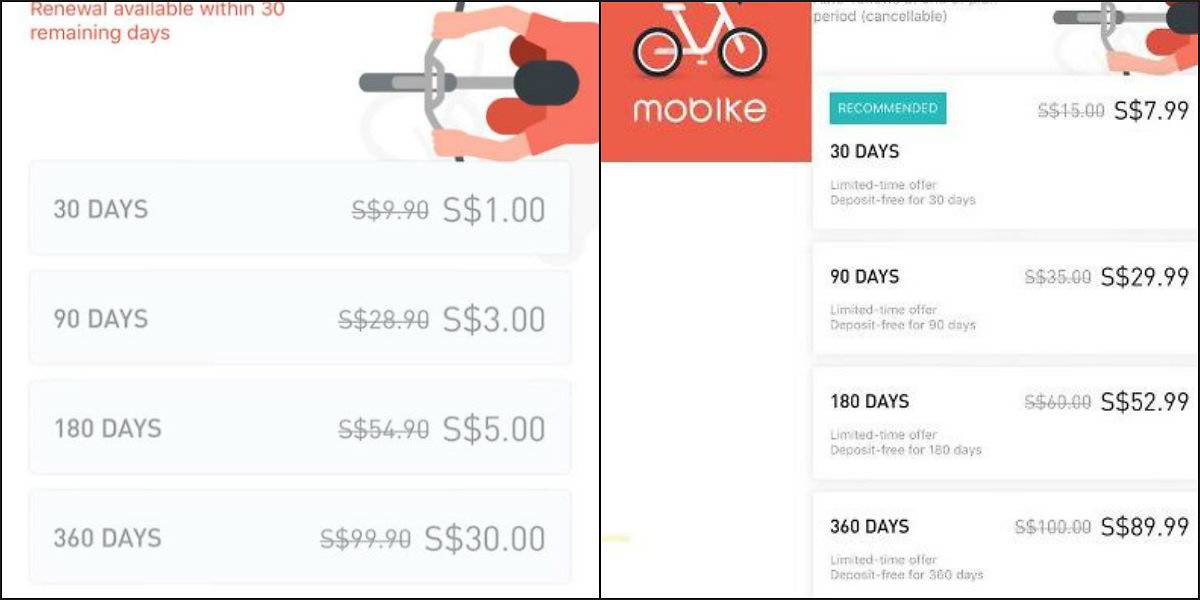SINGAPORE: When occupational therapist Jennifer Lam clicked on her Mobike app on Friday morning (Apr 20), she nearly dropped her smartphone.
The 180-day Mobike pass she purchased last November for S$5 would be ending soon, and she was shocked to learn that it would cost her more than S$50 to extend her pass for the same period.
“Instead of using Mobike for another six months, I’d rather use the money to buy a secondhand bicycle,” said the 26-year-old, who has been using the service for at least twice a day.
“The whole selling point of bike-sharing companies is their low prices. If they charge such (high) prices, why should we bother to use them?” she added.
Ms Lam was just one of many Mobike and ofo users who voiced their discontent over the recent price increases for the bike passes after the end of their respective promotional periods.
China-based company ofo announced on their Facebook page last Monday (Apr 16) that it would be introducing “fresh prices”.

Prices for ofo packages on Apr 20. (Source: ofo/Facebook)
An ofo user Channel NewsAsia spoke to said she previously paid S$1.50 for a 60-day pass. The latest prices on the ofo app indicates that it would now cost S$15 to buy a 60-day pass – ten times the original amount.
For Mobike, a comparison between the price lists indicates that it would cost between S$6.99 and S$59.99 more to purchase passes on Friday (Apr 20) as compared to Nov 4, 2017.

A comparison between Mobike packages on Nov 4, 2017 (left) and Apr 20, 2018.
Freelancer Phoon Jia Hui told Channel NewsAsia that he is “thinking twice” about whether he would be continuing his subscription with Mobike.
“I really like the concept of bike sharing. But if it’s going to cost me S$50 for 180 days, it’s not worth it. Some of these Mobikes have brake issues and other faults,” he added.
Engineer Muhamad Shiraj Jamaludin, who is a frequent user of both bike sharing apps, told Channel NewsAsia that he would not be renewing his passes when they end.
“I use the bicycles during lunchtime as they are really convenient for me to cycle to the nearest coffee shop to eat. But once the passes expire, I’ll probably have to go back to walking,” said the 28-year-old, who works in an industrial area.
NOV PRICES WERE ‘INTRODUCTORY’: MOBIKE
In response to queries from Channel NewsAsia, Mobike Singapore’s Country Manager Sharon Meng said that the Mobike Pass was launched in November 2017 “as a discounted introductory price to encourage more people to try bikesharing”.
“We received extremely positive feedback from users during the promotional period, and we concluded the promotional offer in early March,” she added.
In an emailed statement, ofo maintained that it is the company’s priority to ensure that its bikes remain “accessible and affordable to all its users”.
“With the new ofo pass pricing, we will be able to continue maintaining and growing our fleet size to ensure it meets the demand for more and more shared bike journeys,” ofo said, adding that the company will be including new features to its app in the future.
Some users said they would continue purchasing Mobike and ofo passes in spite of the higher costs.
Administrative coordinator Bok Cheng Yang, who uses shared bicycle services up to eight times a day, said he was “fine with the price increases for ofo and Mobike”.
“It’s understandable the prices have to be increased as the previous prices were really cheap and were meant to be promotional. The new prices are still reasonable for me as I am a heavy user of bike sharing,” he said.
Mobike’s new bike design for Singapore. (Photo: Mobike)
“Bike sharing allows me to maximise my time and money to get the most value out of travelling around in Singapore,” added Mr Bok.
Civil servant Mohammad Noor Danial said he would consider paying the raised prices because he believes in paying “a premium for convenience”.
“For things like maintaining my own bicycle or taking the bus for short distances – I can easily spend between S$50 and S$100 per month. These (bike-sharing) services avoid a lot of hassle,” said the 28-year-old.
CONSUMERS NOT NOTIFIED?
However, Ms Lam pointed out that the two companies could have done better in informing users of the price hike.
She said that Mobike only alerted her when she clicked on the “renew pass” option on her phone.
“There was no notification or anything. Would Mobike have automatically renewed my 180-day pass for S$52 without informing me? I hope not, because I definitely want to stop using the service,” she said.
In its statement to Channel NewsAsia, ofo said registered users have been informed of the pricing changes via a text message directly to their mobile phones, as well as through ofo’s Instagram and Facebook pages.
However, Mr Shiraj, who uses ofo almost daily, said that he came across the notification of the price increase only because he was a heavy user, and so saw it on the app recently.
“For those that don’t open the ofo app often, and they subscribe to auto renewal, they might be charged with the updated prices without them realizing it,” he said.
Meanwhile, Ms Lam said she is considering switching to bike and e-scooter sharing app GrabCycle once it is operational across the island.
The app, owned by Ride-hailing company Grab, allows users to share bikes and e-scooters from Grab’s mobility partners – oBike, GBikes, Anywheel and PopScoot.
GrabCycle will be piloted at Sentosa in the first half of this year before it is rolled out at other venues.
“I heard it’s much cheaper and gives us so many options. Looking at alternatives is the right thing to do now,” Ms Lam said.




